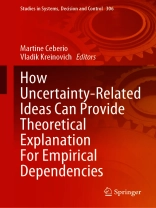This book shows how to provide uncertainty-related theoretical justification for empirical dependencies, on the examples from numerous application areas. Such justifications are needed, since without them, practitioners may be reluctant to use these dependencies: purely empirical formulas often turn out to hold only in some cases.
Examples of new theoretical explanations range from fundamental physics (quark confinement, galaxy superclusters, etc.) and geophysics (earthquake analysis) to transportation and electrical engineering to computer science (image processing, quantum computing) and pedagogy (equity, effect of repetitions). The book is useful to students and specialists in the corresponding areas.
Most of the examples use common general techniques, so the book is also useful to practitioners and researchers in other application areas who look for ways to provide theoretical justifications for their areas’ empirical dependencies.
Table des matières
Status Quo Bias Actually Helps Decision Makers to Take Nonlinearity into Account: An Explanation.- A Natural Explanation for the Minimum Entropy Production Principle.- How Uncertainty Related Ideas Can Provide Theoretical Explanation For Empirical Dependencies.- Why Class-D Audio Amplifiers Work Well: A Theoretical Explanation.












